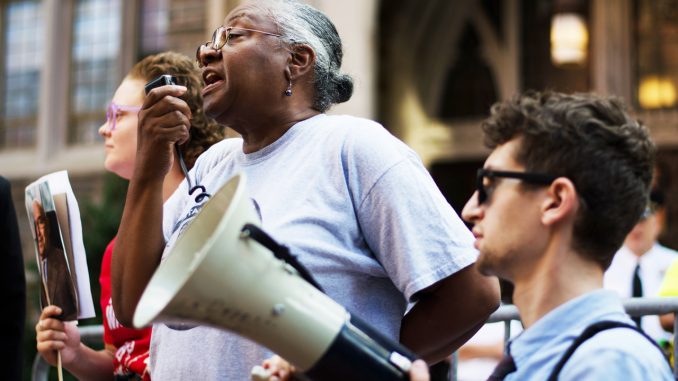
After Ruth Birchett went through a seven-week educational program, she couldn’t help herself but recommend it to her friends.
Birchett, a block captain of the 1900 block of Norris Street and founder of the Heritage Community Development Corporation, and Jackie Wiggins, who lives on 20th Street near Diamond, are both prominent members of the protest group Stadium Stompers.
Birchett and Wiggins use the skills they learned from a program led by the Citizens Planning Institute — an outreach and education branch of the City Planning Commission — to fight against Temple’s proposed on-campus football stadium.
The CPI’s seven-week course, offered once in the fall and spring, teaches participants about registered community organizations, zoning and land use, developers and public spaces, Wiggins said.
“[Birchett] has told others in the neighborhood to take it because it gives you a sense of how the city functions particularly when we’re talking about the planning process for neighborhoods,” said Wiggins, a Spring 2016 graduate.
Birchett, a Fall 2015 graduate, said the CPI courses taught her the value of being in an RCO, which are community groups that screen potential developments in the neighborhood.
As of June, the Heritage Homeowners Association, an arm of the Heritage Community Development Corporation, is now an RCO. The proposed stadium site is within its boundaries.
“That was strategic because any application that Temple University will present […] for zoning or the stadium we will be notified,” Birchett added.
RCOs inform community members when there is going to be a zoning decision that will affect them. Then, RCOs will call meetings to provide space for community input.
When Birchett first heard about RCOs, she did not support them.
“They were proposing to do the RCO and there were community meetings about it with the City Planning Commission. …I was against it,” Birchett said. “I felt like it would take away from the direct citizen input about the development process in our community.”
After taking courses at CPI, Birchett learned about updated zoning and RCO laws that have changed in her 30 years of community development work and how RCOs could be relevant to her community.
“If I wanted to remain relevant in terms of a community asset or planning and development for our community, I had to get into that class and understand what the new laws were,” Birchett said.
RCOs are notified through emails and letters when a project applies for zoning approval, which is important to Birchett, she said.
“I am one of the many persons that’s been doing research to check in with the different city departments to see what Temple is up to, to see if Temple has put an application in,” Birchett said. “So now the stress is off. While I still check in with these various places, I don’t have to worry about Temple slipping something under, slipping an application in on us.”
The CPI has also been helpful with research that the Stadium Stompers will use in a potential testimony to City Council against Temple’s stadium plan, Birchett said.
“When I share with [CPI] that I was trying to collect data, they’re able to often send links or even talk with us about where we can go to find that research,” Birchett said. “It’s not just that we attended the class, they continued to be an ever-present resource to us.”
The CPI also provided a space to network with others who are working to better their communities. Some classmates provided information “they think might be useful in our fight,” Birchett said.
Wiggins said the CPI informed her further about the Civic Design Review, a process in which projects must be presented at a meeting to a design board with a group representing community stakeholders. The project must also meet the city’s zoning code.
“The CPI course for me personally was just wonderful,” Wiggins added. “I think everybody should take it if they can.”


Be the first to comment